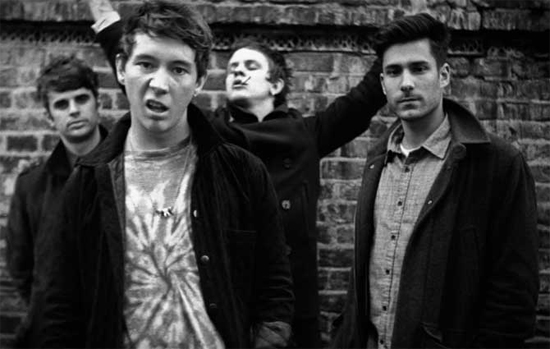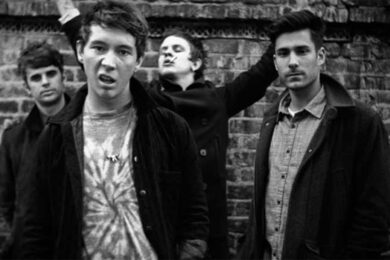"If you don’t want to hear the future of music, leave now." Lee Newell, Brother
Those were Brother’s first words upon taking to the stage at now-defunct London venue The Flowerpot this September. Anyone who scraped their last modicum of sense out of the bottom of their pint of Stella and scarpered, however, might have had their desires served better had they stayed for the duration of their set; a smug pub rock slop togged up in shop-fresh sepia Union Jack and a manifesto that railed against intellectualism, dubstep, and anything that’s achieved much of cultural note post-1998. Despite certain quarters referring to them as British guitar music’s "new white hopes," there’s nothing novel about Brother.
"We’ll see things they’ll never see, you and I are gonna live forever." Oasis, ‘Live Forever’
The Slough four-piece play what they’ve termed "gritpop," wear owly Lennon glasses, and have appointed themselves the logical successors to Oasis’ throne. Topless women embrace in the bath in the video to their first single, ‘The Darling Buds Of May’, the lyrics to which go, "And when you walk / and when you walk / I feel better now because her birthday’s in May / it is what it is," a string of vague nothing-nesses that recall two other brothers’ lyrical nonsense. They played their second London show at Britpop’s abandoned Braunes Haus, the Met Bar, they’ve already tried to start yappy Jack Russell scraps with fellow hyped fret fiddlers The Vaccines and derided all music hailing from across the pond as "that American shit." Geffen signed them for a six-figure sum, and Stephen Street is producing their album. Brother – metonymic of lad-rock by name alone – are the latest Groundhog Day in music’s willfully repetitive narrative.
On the basis of one awful single and some throwaway and obvious gobby quotes, you’d wonder why and how they’ve even achieved the infamy that they so desperately crave – why anyone would deign to lend them even the credibility of negative oxygen, and why I’d bother writing this. But just as Brother are happy to rehash and repeat the tired tropes of Britpop without the faintest attempt at recontextualisation, so are they an easy journalistic anaphora; whereby their coining of their own genre one letter away from what Steven Wells termed a byword for "unchallenging guitar music played by white suburban males" ensures optimum reception of message, ease of communication, the perfect level of contention in the comment box beneath the article. Brother clearly value neither intellectualism nor art nor ingenuity, but to add insult to injury, there’s an abhorrent – and increasingly prevalent – streak of press protectionism in that no-one’s willing to call them out on being such charlatans just in case they do make good on the new white British guitar hopes tag that’s been desperately affixed to them (perish the thought). Instead, their braggadocio is met with the fond air of a proud father doting on a rude child and excusing their behaviour as something all kids do. "But they’re funny," those looking for click-throughs chuckle. "We need bands like Brother to come and stir shit up," others affirm. "We need to stay sat firmly on the fence and entertain them until it’s clear as to whether they are actually going to be successful," no-one is saying.
In Christopher R. Weingarten’s speech ‘Twitter And The Death Of Rock Criticism’ given at the 140 Characters conference in New York in 2009, he discussed how old school critics started fearing for their jobs with the rise of blogs and the abundance of unjaded young whippersnappers willing to work for free in exchange for "concert tickets and a pat on the head." He goes on to posit that "magazines and websites stopped separating the wheat from the chaff and started reporting on what blogs were saying." No blog worth their salt would dedicate more than a cursory "WTF" post with regard to Brother. Their retro stylings don’t constitute a notch on the totem of newness before which the blogosphere prostrates itself. The print press, on the other hand, see their chance to claim the band as their own, should they become successful. It’s easier to retell an old story than to start a new one. Brother’s craven copying of a movement that occurred when they were probably knee high to a 12" puts the old school critics in a position of power – having experienced Britpop firsthand, they can reclaim relevance and lead the most valid discussions in their search to claim championship over the next "great British guitar band."
When did it start, this annually retrodden concept that only guitar bands can define the Greatness of British music? The last one of any significance was arguably The Libertines, whose reunion this year was met with endless cover features and delight at a concrete event in their interminable "will they, won’t they?" rock and roll pantomime. Or was it before that, with Britpop and so-called "Cool Britannia," that freakish time when politicians seemed to give a shit about young people – or at least about seeming relevant to them. It’d be charming to think that beneath Brother’s blokey shtick there’s a secret desire to hark back to a time of comparative political optimism, but it’s unlikely.
"So what’s the matter with you, sing me something new." Oasis, ‘Stand By Me’
The idea that we need four blokes singing about birds and wearing their unremarkable-ness as a badge of honour to constitute some kind of barometer for the health of the UK music scene is depressing. Offensive even, considering that in 2010 alone, music was in as fine a fettle – finer, arguably – than the so-called glory days that these goons are trying to prolong. Records from LoneLady, I Like Trains, Anika, New Young Pony Club, The Fall (still "the best new band in Britain," as tQ’s Luke Turner proclaimed in the NME review of their album, met with agreement from MES himself), These New Puritans, Everything Everything, Errors, Ikonika, Islet, Factory Floor – to mention but a few – are as British as British could be in their individual quirky brilliances and absolute lack of inertia. Behind each group and album is an inspiring and smart story that looks at their respective musical heritages and realises their influences anew. By comparison, Brother’s aspirations – provoking beef with other no-mark indie newcomers and headlining Glastonbury within two years of forming (good luck with that) – read like a nursery rhyme guide to becoming a rock and roll star, repeated by the press with all the gusto of a beleaguered parent intoning said story to a baying infant each night.



